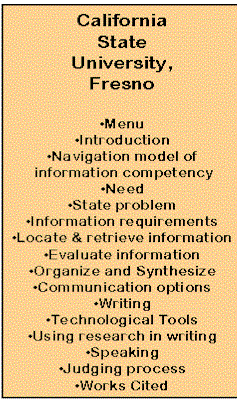 How to Do It * Technological Tools * ALIS * Periodicals * Internet
* Alta Vista * Yahoo
How to Do It * Technological Tools * ALIS * Periodicals * Internet
* Alta Vista * YahooWriting and Information
Competency in Small Bytes
by John A. Cagle and Ross LaBaugh
 How to Do It * Technological Tools * ALIS * Periodicals * Internet
* Alta Vista * Yahoo
How to Do It * Technological Tools * ALIS * Periodicals * Internet
* Alta Vista * Yahoo
Locate and retrieve relevant information
To this point in the process, you have been clearly getting in mind what your objective is, what central question should guide your research, and generating a list of key questions, topics, and keywords to use in guiding your quest for information. The next phase of the process is an effort to locate and retrieve relevant information.
Where can you go to get this information? While people tend to get information from sources close to them that is easy to get, and while the Library is obviously a vital resource in a university and for the community, there are in fact many places to get information.
First of all, you can look to yourself. What knowledge do you already have? Even if you have not had personal experience with a topic, recall things you have heard from other people about it. The Vietnam War may have been before you were born, but you may recall hearing about life in America during the 1960s and ‘70s. That sort of information can be quite relevant to many topics. You can interview people you know or can get in touch with about topics you are investigating. There may be government or private agencies that are relevant to your topic, and you can go to these organizations to personally talk with experts. In your possession also for a given class you have four additional resources: your notes from your professor’s lectures, your textbooks, your professor (you can and should talk with your professors about your research and writing projects), and your classmates.
Second, there are many documentary resources. Businesses, organizations, governmental agencies, hospitals, schools, police departments—all not only have people, but they have records, publications, brochures, flyers, membership records, etc. These kinds of materials often can be accessible to you if you ask appropriately. In this class of primary source material are letters, diaries, and other types of written material. You may also find audio and videotapes, as well as other mediated materials.
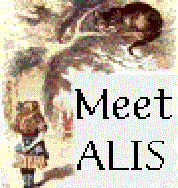 Third,
the University Library is a central resource for research. It has more than books
and magazines, although certainly there are plenty of those. You will want to become
familiar with the various departments of the library, such as the Reference Department,
the Periodicals Department, and Government Documents. Besides bibliographies, biographies,
encyclopedias, and abstracts and indexes, the Library also has many electronic databases
with useful information. You should learn the physical layout of the Library so you feel
comfortable in it and can easily get from place to place. You should also learn how to use
the various technological tools (such as ALIS and periodical databases at Fresno State)
that give you access to the many resources. InfoTrac, for example, is a powerful and
remarkable electronic index of periodicals. Using it, you can enter keywords of your
topic and search not only popular magazines, but also over 2000 academic journals; about
40% of the articles can be retrieved in full-text and read on your home computer.
Third,
the University Library is a central resource for research. It has more than books
and magazines, although certainly there are plenty of those. You will want to become
familiar with the various departments of the library, such as the Reference Department,
the Periodicals Department, and Government Documents. Besides bibliographies, biographies,
encyclopedias, and abstracts and indexes, the Library also has many electronic databases
with useful information. You should learn the physical layout of the Library so you feel
comfortable in it and can easily get from place to place. You should also learn how to use
the various technological tools (such as ALIS and periodical databases at Fresno State)
that give you access to the many resources. InfoTrac, for example, is a powerful and
remarkable electronic index of periodicals. Using it, you can enter keywords of your
topic and search not only popular magazines, but also over 2000 academic journals; about
40% of the articles can be retrieved in full-text and read on your home computer.
Fourth, the Internet (sometimes called the World Wide Web) has evolved into an important resource. Essentially the Internet is a file transfer system which connects computers to one another, together with a browser program that takes the files and creates the visual and auditory images you see when "you surf the web." Web browsers such as Netscape or Microsoft Internet Explorer give you access to these files. Some resources are extraordinary. For example, during the infamous "O.J." trial, one Internet site presented transcripts of the closing arguments of the lawyers in the court within ten minutes of the words being uttered! The Library of Congress, among other things, has archives of millions of photographs from American culture and history. If you wanted to study the ancient Greek writers, virtually all the extant classical books of the Greeks and Romans is available on the Internet in full-text and translated into English (but available in Latin or Greek versions as well in many cases). But there is also a lot of junk on the Internet, including pornographic and obscene materials--creating clear problems for our society as we learn what the Internet is and how to manage it, even as it is still developing. In many ways, the Internet is literally anarchy.
How to Do It * Technological Tools * ALIS * Periodicals * Internet * Alta Vista * Yahoo
Information Gathering Behaviors: How to do it
Getting to this information involves some physical effort, of course. It is a process you will repeat over and over.
In this process, there are many good and useful ideas about how to do it, but what is clear is that you have to develop a system to do this work that works for you.
When you find a book using the electronic card catalog, you need to write down the call number of the book. It is a key to actually finding the book in the book stacks, where the books are kept.
It has always been my attitude in doing research that I am on a voyage of discovery--I sort of know where I would like to end up, but I don't know exactly what path will take me there. The main challenge is to get to a place in the Library at which you might find lots of books on the subject you are interested in. For me, no single book I find in the catalogue is important in itself--its greater value lies in being a map to a subject area in the book stacks. For example, PN 4121 is the call number for public speaking books; and you will find shelves and shelves of books, large and small, written by different people with different perspectives and interests. When you get to the call number location for a book you have identified, what happens if the book is not there? Many students will just return to the computer to try to find another book, ignoring the fact that there literally might be 300 better books at the same location.
Another thing about books: I've known students who are afraid of the books, feeling they can't possibly read them all. The fact is that you don't need to read them all. On each research investigation, remember, you have a focused topic you are trying to find out about. Look inside a book (using the table of contents and the index) for material that closely relates to your topic, because that material is what you need to read and understand. An 800-page book may only have five pages of information relevant to your research topic, but it could very well be the most important thing you find.
One good idea is to talk with your professors and with other students about how they do their research. What works for them? You may learn a useful way to do something. What size paper you use (or if you use paper at all!) is not so relevant--that you develop some method to record information is.
Some people take notes on 4" x 6" notecards. Notecards are easy to carry around, easily fitting into a pocket. When you have taken notes on several, you can sort them and begin to organize them. If you use notecards, here are a few good suggestions:
Some people use 8.5" x 11" paper for their notes. In fact, for better or worse, it is a system I personally like to use. I write the source at the top of a page, but just write my notes as I work down the page, keeping a line between each entry. Each "piece" of information, of course, has to have the page reference. Later when I am planning my writing, I will put reference codes in the outline which are linked to the various specific notes.
How to Do It * Technological Tools * ALIS * Periodicals * Internet * Alta Vista * Yahoo
Technological tools
Several tools are available on a computer to help you take notes. You can use Microsoft Word (or any word processing program) to keep your notes. Entering the notes into the word processing file as you go means you won’t have to write the words twice. You can use the copy-and-paste function to move the material from your notes into the text of your essay. You can write the Works Cited page for your paper as you go, keeping it in alphabetical order. There are some special programs available to help you take notes, prepare bibliographies, and other research tasks.
Using a desktop computer at home or in a campus lab, you must bring the material to the computer. Using a laptop computer, you can bring the computer into the library and take notes on a table. The University Library and the Internet are two central resources for connecting to the world of information. More and more resources are being made available to you as a student through a computer connection. Using a web browser (such as Netscape or Internet Explorer), you can connect to the University Library at this URL:
"URL" is part of the language of the Internet; it means Uniform Resource Locator and is an address your web browser can interpret and use. Many terms may sound strange to you as you begin to use the Internet, but you will find you will quickly get accustomed to the basic technical vocabulary. In fact, you can easily learn to create webpages for yourself. At Fresno State, your e-mail account includes the capacity to create a website that you yourself can create and manage.
The Internet has grown very rapidly. What is it? O'Leary and O'Leary gave a nice description of the Internet: "It is a network of thousands of computer networks that allows computers to communicate with one another. A network is a system that connects two or more computers, allowing sharing of resources" (3). Using the Internet, you will be able to send and receive e-mail, transfer files among computers, search for information, and participate in discussion groups and news groups. In fact, many professors teaching university courses have a great deal of course material on the Internet for their students to use.
The University Library has a great number of materials to aid you in your quest for information and knowledge. Many people think of libraries as having books and magazines, but there are many other resources as well--from government documents to audio and videotapes to reference materials.
Many of these materials have already been put "online" for people to access via computers anywhere and anytime; that is, whether your computer is in a computer lab on campus or at your home in your bedroom or in a hotel room in France or Australia, you can use it to search the Library's book catalogue, to search periodical databases for articles related to your interests and studies, and to search for other pertinent material throughout Fresno State's vast collection--and you can connect to the Library's many resources 24 hours a day and 365 days a year. What is now in electronic form is already amazing, but more and more is added to these resources and services every week.
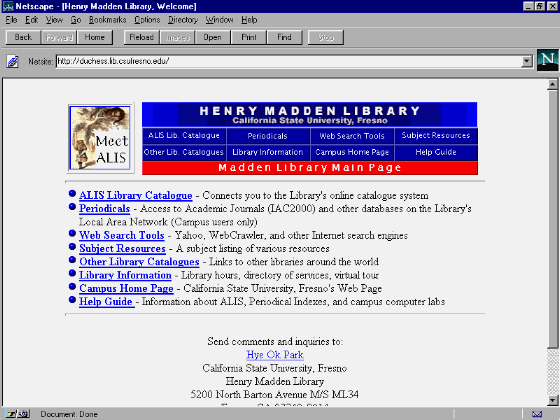 When you enter this URL,
the web browser connects you to the Henry Madden Library's homepage. If you click with
the mouse pointer on the underlined words (called hyperlinks and usually blue
on most browsers), you are taken to another file. Embedded within the source code for the
webpage are codes that create the graphic and text elements, and some of them create
linkages to other URLs. In a second you can go from Fresno to a website in Denmark or
Japan.
When you enter this URL,
the web browser connects you to the Henry Madden Library's homepage. If you click with
the mouse pointer on the underlined words (called hyperlinks and usually blue
on most browsers), you are taken to another file. Embedded within the source code for the
webpage are codes that create the graphic and text elements, and some of them create
linkages to other URLs. In a second you can go from Fresno to a website in Denmark or
Japan.
The first three hyperlinks on the Henry Madden Library's homepage will take you to the ALIS Library Catalogue, to Periodicals, and to Web Search engines. You can better learn to use these resources in a "hands on" experience in a computer lab and you will have that opportunity as part of the Summer Bridge curriculum. The next few pages will give you an initial peek into how these search tools work.
How to Do It * Technological Tools * ALIS * Periodicals * Internet * Alta Vista * Yahoo
ALIS stands for Automated Library Integrated System. When you click on the ALIS hyperlink, and a couple of opening screens to log you into the resource, you will see this page:
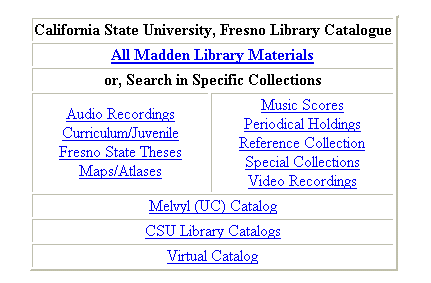
Often you will click on the All Madden Library Resources hyperlink, but you may select any of the special collections instead. The next screen is a box for putting in the keywords for the search. You enter keywords related to your topic. You can also search for an author's name, for the title of a book or for any word in the title, for specific subject fields, etc.
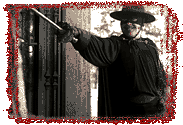 At this point we need a
topic to use. The "culture topic" that comes to me most vividly grows out of a
recent film I saw at the movie theater, The Mask of Zorro. You've probably seen it,
too. The film depicts an adventure set in the days when California was part of Mexico and
Los Angeles was a small pueblo. The serious question occurs to me:
At this point we need a
topic to use. The "culture topic" that comes to me most vividly grows out of a
recent film I saw at the movie theater, The Mask of Zorro. You've probably seen it,
too. The film depicts an adventure set in the days when California was part of Mexico and
Los Angeles was a small pueblo. The serious question occurs to me:
What keywords come to mind? Here are a few that occurred to me: California, history, Californian history, Los Angeles, pueblos, and (even) Zorro. You enter one or more of these words into the box and click on Search. What will you find? I am tempted to say, there is no magic here and a great deal of luck. Don't be too disappointed if you can't find a book on the Zorro keyword or some other word you felt would surely strike gold! Just keep trying different words and approaches. If one approach doesn't work (e.g., history), maybe another would (motion pictures).
 My own little search got me to a book
that would probably be worth taking a look at. Clicking on the full-record
button will bring up all the bibliographic information about the book, including the call
number I would need to find it. ALIS allows you to mark the books you are interested in
using, by the way, and at the end of your session will print out a bibliographic list of
the books you selected, including call numbers. On some occasions I find it quicker to
just jot down the author's name, title, and call number (minimally things useful in
actually getting the book in the Library).
My own little search got me to a book
that would probably be worth taking a look at. Clicking on the full-record
button will bring up all the bibliographic information about the book, including the call
number I would need to find it. ALIS allows you to mark the books you are interested in
using, by the way, and at the end of your session will print out a bibliographic list of
the books you selected, including call numbers. On some occasions I find it quicker to
just jot down the author's name, title, and call number (minimally things useful in
actually getting the book in the Library).

Another nice feature of the full-record screen is that it not only tells you the call
number for the book, but it even tells you whether the book is in the Library or not.
There are plans that will soon enable you to place an order to check out a book using the
Internet connection.
Having found one book, of course, you keep going until you have enough books to get a good start in the book stacks. You may find more books than you need to use, but you'll want to do a quick survey of each book to decide if it really will be useful. Often the focus of the book will not be on your research topic, notwithstanding the fact that the title sounded so good!
How to Do It * Technological Tools * ALIS * Periodicals * Internet * Alta Vista * Yahoo
Articles in academic and professional journals are an especially valuable resource. Competent scholars in virtually every field write papers to share research and the latest discoveries, to pose serious questions for inquiry, to suggest applications of knowledge, and so on. At the Library's homepage, click on Periodicals for a list of various periodical databases. There are a couple of quick selections to get to InfoTrac. You will be asked to "log-in" with your e-mail user name and password on Lennon or Zimmer (university e-mail servers--named for modern artists, by the way). There are several excellent resources there, perhaps the most generally useful hyperlink is the one called General Periodicals. Then select the Expanded Academic Index. Click on that hyperlink and you'll enter InfoTrac search engine. Finally, click on the Expanded Academic Index and you are ready to enter your search keywords.
I entered history california mexicans into the search engine and came up with some excellent sources. Below is the report of the citations found on this search. About 1/3 of over a million articles in the database are available for viewing in full-text form, including graphics. That is actually amazing--when I was in college, such a possibility was literally only talked about in science fiction stories.
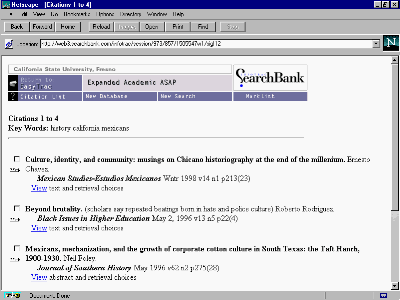
In order to view the article, you just click on view and you get the entire article. If you open Microsoft Word at the same time and switch back and forth, you can take notes as you are reading the article, including copy-and-paste to copy important quotations into your online notes. You can print the article for later use. Here is what the text view looks like:
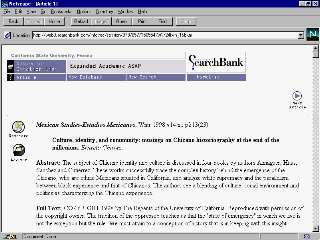
Using the search engines, whether in ALIS or InfoTrac or on the Internet, involves the same basic procedures, with small variations. Here are a few tips that will help you get started:
- Enter the keywords in lower case letters because all search engines use them and because even one capital letter narrows the range of things you will find. For example, if I entered Alis in a keyword search, it would not find ALIS, because the search engine views "Alis" as a specific request for only that form of the word. If I entered "alis," it would find alis, Alis, and ALIS.
- Use quotation marks to group a phrase. If you search for cesar chavez, what you'll get are 4000 items for cesar (Cesar Smith, Cesar Gonzalez, etc.), 10000 items for chavez (Chavez Ravine, Luis Chavez, etc.), and some for Cesar Chavez. Entering "cesar chavez" restricts the search to that exact string.
- Some search engines do not use that system, so you indicate connected words in this form: cesar AND chavez. The word AND is a connector, as is OR and NOT.
Finally, many search engines allow you to use a + to eliminate any webpage found that does not have that page.
How to Do It * Technological Tools * ALIS * Periodicals * Internet * Alta Vista * Yahoo
Internet searches
![]() The third hyperlink on the Library's homepage lists several web search tools, each of which has value for different purposes.
Experiment with them and you'll not only learn how to use them easily, but also will
perhaps find you like the way one works better than another. My two favorites are
AltaVista and Yahoo. Note, you can connect directly to any of these search tools without
going through the Library's homepage.
The third hyperlink on the Library's homepage lists several web search tools, each of which has value for different purposes.
Experiment with them and you'll not only learn how to use them easily, but also will
perhaps find you like the way one works better than another. My two favorites are
AltaVista and Yahoo. Note, you can connect directly to any of these search tools without
going through the Library's homepage.
The AltaVista search tool is an enormous database. The Digital computer corporation has sponsored this program, which essentially seeks and memorizes as many websites as it can find. Its search engine searches the entire database (literally millions and millions of websites all over the world) for the present of your keywords in the text of the webpages. Other search engines only search for keywords in the titles of the webpages, so AltaVista is especially powerful as a research tool. The AltaVista search engine looks like this:
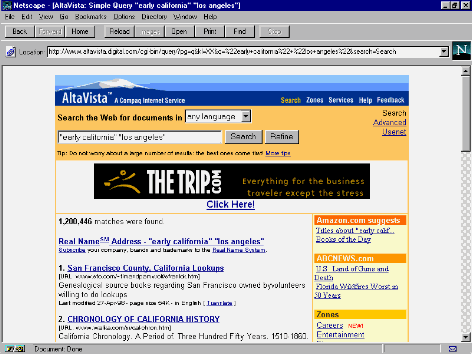
I entered "early california" "los angeles" as the keywords for my Alta Vista search, and it found over 2000 possible links. AltaVista put them on the screen only 10 at a time, so don't panic. One website was an interesting history of California:
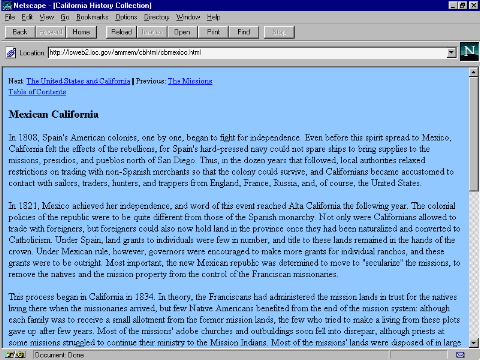
Another website wasn't very helpful because it was on the history of California as a state, but it did contain a hyperlink, which got me to a website of the Library of Congress with excellent material on Mexican California.
![]() Yahoo is
also an excellent tool. Although it has a search engine, it has a "table of
contents" or "yellow pages" sort of approach to organizing websites into
useful categories. It has a "tree" structure that you follow from general topics
down to more and more specific topics. Another useful thing about Yahoo is that it has an
"editorial board" that screens the materials it puts in its hyperlinks for
public interest. Its initial screen:
Yahoo is
also an excellent tool. Although it has a search engine, it has a "table of
contents" or "yellow pages" sort of approach to organizing websites into
useful categories. It has a "tree" structure that you follow from general topics
down to more and more specific topics. Another useful thing about Yahoo is that it has an
"editorial board" that screens the materials it puts in its hyperlinks for
public interest. Its initial screen:
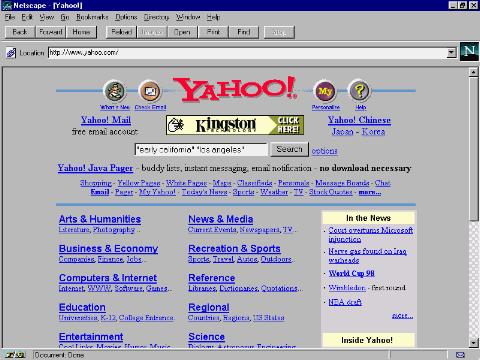
Note that it has a box to use in a search, which works similarly to AltaVista and most all other web search engines.. Below is the set of initial general categories. With some experience using Yahoo, you will get familiar with how it organizes things. For example, if you wanted to find out about parliamentary procedure, you need to go a couple of layers into the system: Government to U.S. Government to Legislative Branch to Parliamentary Procedure.
I entered the same keywords ("early california" "los angeles" ) into this system and found a large number of potentially useful websites. In particular, I got to an excellent website presenting a history of California life in the early 19th Century. From a quick look, it seems quite pertinent to assessing whether the Mark of Zorro is authentic historically.
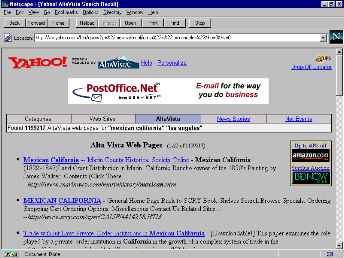
This article has additional hyperlinks to other resources:
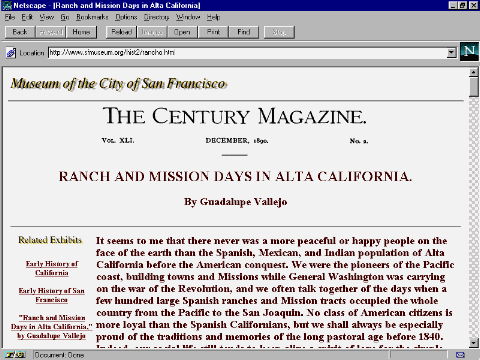
How good is the material on the Internet for your university research? Some of it is superb and unique. Some of it isn't. Everybody is still learning how to use the Internet. Many professors are concerned that too much reliance on the Internet--because it is easy to use, is quite colorful, has sound and video even--leads students from reading scholarly books and articles. In each class you take as a university student, you might talk with your professor about her or his attitude on this topic. As a general rule of thumb, look for the best resources you can find and use them, but overuse of the Internet in your research should be avoided.
Links to Previous Competency and to Next Competency
Link to Table of Contents
Communication and
Information Competency in Small Bytes
Menu Introduction
Need State problem Information requirements Locate & retrieve
information Evaluate information Organize
and Synthesize Communication options Writing Technological Tools Using research in writing Speaking Judging process Works Cited
ã 1998 by John A. Cagle, Professor of Communication, California State University, Fresno.
This information competency website was designed by John A. Cagle (Department of Communication) and Ross LaBaugh (Instructional Coordinator, Henry Madden Library) as part of a grant from the California State University. It continues to be under construction.